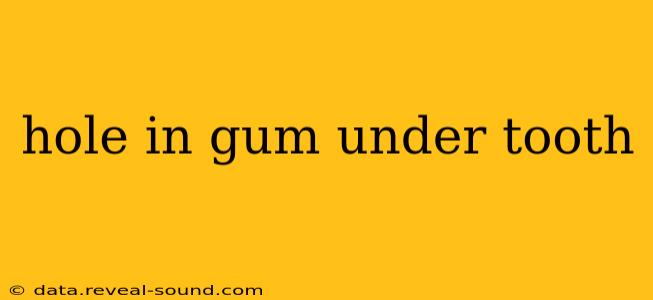Discovering a hole in your gum under a tooth can be alarming. This condition, often referred to as a periodontal pocket or gum recession, isn't something to ignore. It can range from a minor irritation to a serious infection requiring professional intervention. Understanding the causes, potential treatments, and preventative measures is crucial for maintaining good oral health.
What Causes a Hole in the Gum Under a Tooth?
Several factors contribute to the formation of holes in the gum under a tooth. These are often interconnected and can worsen over time if left untreated.
-
Gum Disease (Periodontitis): This is the most common cause. Bacteria build up along the gum line, causing inflammation (gingivitis) that, if untreated, progresses to periodontitis. This infection destroys the tissues and bone supporting your teeth, creating pockets or holes between the teeth and gums.
-
Aggressive Brushing: While brushing is essential, aggressive scrubbing can damage gum tissue, leading to recession and creating the appearance of holes.
-
Gum Recession: This is a gradual process where the gum line pulls back, exposing more of the tooth's root. This can be caused by genetics, hormonal changes (pregnancy), certain medications, or even clenching or grinding your teeth (bruxism).
-
Trauma: An injury to the gums, such as a fall or accidental bite, can also cause a hole or tear.
-
Improper Flossing: Incorrect flossing techniques can also damage gum tissue, contributing to recession.
-
Tooth Decay: In some cases, severe tooth decay can extend below the gum line, potentially creating a hole or pocket.
How is a Hole in the Gum Under a Tooth Treated?
Treatment depends on the underlying cause and severity of the hole. Your dentist will perform a thorough examination, including X-rays, to determine the best course of action.
-
Professional Cleaning (Scaling and Root Planing): For gum disease, this procedure removes plaque and tartar from the teeth and roots, helping to reduce inflammation and infection.
-
Antibiotics: If the infection is severe, your dentist may prescribe antibiotics to fight the bacteria.
-
Gum Grafting: In cases of significant gum recession, a gum graft might be necessary. This surgical procedure uses tissue from another area of your mouth (or a donor) to cover the exposed root surface.
-
Fillings or Crowns: If tooth decay is involved, fillings or crowns may be required to repair the damaged tooth.
-
Extraction: In severe cases where the tooth is beyond repair and the infection is extensive, extraction may be necessary.
What are the Signs of a Hole in the Gum Under a Tooth?
Recognizing the signs early is vital for effective treatment. Look out for:
- Bleeding gums: This is often an early indicator of gum disease.
- Swollen or red gums: Inflammation is a common symptom.
- Receding gums: The visible part of your teeth appears longer than usual.
- Persistent bad breath: This can be a sign of infection.
- Loose teeth: This is a more advanced sign of gum disease.
- Pus: The presence of pus indicates a serious infection.
- Sensitivity: Exposed roots can lead to increased tooth sensitivity.
Can a Hole in the Gum Under a Tooth Heal on Its Own?
Unfortunately, a hole in the gum caused by gum disease or recession usually won't heal on its own. The underlying infection or tissue damage requires professional dental intervention. While minor trauma-related holes may heal with proper care, it's always best to consult a dentist to ensure proper healing and prevent further complications.
How Can I Prevent Holes in My Gums?
Prevention is key. Here are some essential steps:
- Maintain good oral hygiene: Brush twice daily with fluoride toothpaste and floss daily.
- Use a soft-bristled toothbrush: Avoid harsh brushing techniques.
- Visit your dentist regularly: Regular checkups and professional cleanings are crucial.
- Quit smoking: Smoking significantly increases the risk of gum disease.
- Manage stress: Stress can weaken the immune system, making you more susceptible to infections.
- Eat a healthy diet: A balanced diet supports overall health, including oral health.
Addressing a hole in your gum under a tooth requires prompt professional attention. Don't hesitate to schedule an appointment with your dentist if you experience any of the mentioned symptoms. Early diagnosis and treatment are key to preserving your oral health and preventing more serious complications.
